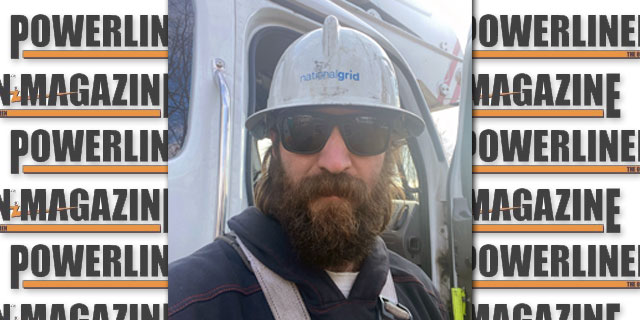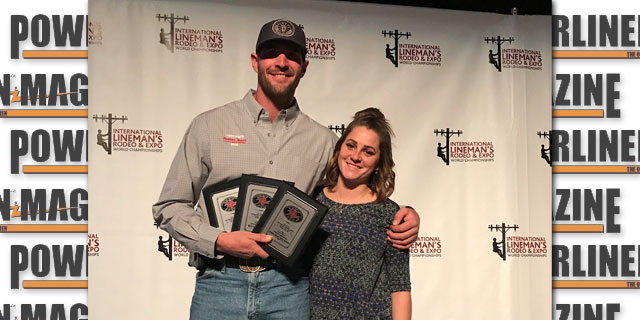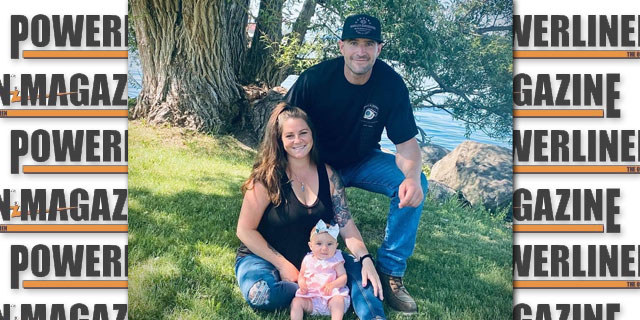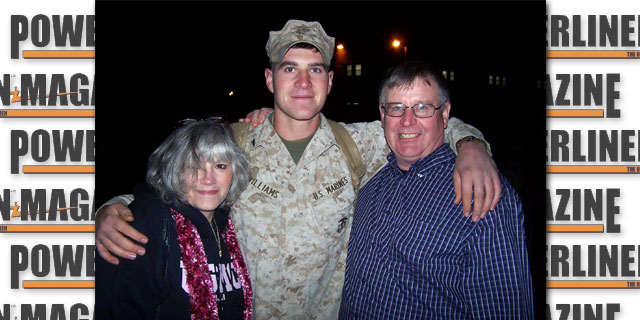Tell us about your beginnings, what was it like growing up?
I was born and raised in the small town of Livonia in the Finger lakes area of upstate NY. I have an older brother and an older sister. I attended Livonia schools where I played some sports growing up until I basically got my working papers and started working 2 part time jobs. My mother worked at a bank the next town over and my father was a Union Tree trimmer. When I was in 11th grade it got to the point where I needed to figure out what I wanted to do the rest of my life. I was always more interested in making money than furthering my education, so the idea of going to work with my father was pretty high on my list, but I received a phone call one evening from a Marine Corps recruiter and decided to sit down with him the following day. After a couple hours of talking and me taking a practice Armed Services Vocational Aptitude Battery (ASVAB), I was off to Military Enlistment Processing Station (MEPS) the following morning to enlist in the delayed entry program. I continued to work through high school and graduated in June of 2008. I wasn’t leaving for Paris Island until December, so I worked full time with my uncle’s tree removal company. It was a pretty serious wakeup call when I got to Paris Island but after the 3 long months, I claimed the title of United states Marine. From there I went to Camp Geiger in North Carolina for the school of infantry where I was trained to be an 0341 infantry mortarman…..after that I served the rest of my time with 1st battalion 9th marines serving to tours overseas…..
Tell us more about your time overseas.
My first deployment was with the 24th MEU ( Marine Expeditionary Unit). We were slated to go straight to Afghanistan but the earthquake that hit Port Au Prince Haiti changed our plans. Being on a MEU, we were basically the President’s quick reaction force since the Marine Corps is the only branch the President can send anywhere without Congress voting on it for a short period of time. So, we were the first boots on the ground there, to provide security for humanitarian efforts. From there we crossed through the Suez Canal and made our way to Djibouti, Africa where we did some stuff with the French foreign legion. After that, we made our way home and then, 7 months later, we were slated to fly to Afghanistan. By this time, I was a squad leader, so I had a team of marines under me. We were sent to Trek Nawa in the Helmand province which runs along the outskirts of Marjah. This was my combat deployment, which I won’t go into details. While I was there, we had about 25 marines at a patrol base that we shared with the Afghan national army. Spent 7 months there doing dismounted patrols. I was an infantry mortarman by trade, but we only shot a couple dozen mortars while we were there, so the rest of the time I pretty much fulfilled what a rifleman would do. We were flown around in helicopters a bunch when we’d team up with other platoons to perform joint operations. I learned a lot about life being there and I’m proud to say I served with some of the greatest and bravest men I’m sure I’ll ever meet in my life. After this deployment is when I decided I was going to be done, having served my 4 years, which I don’t regret. I absolutely love linework and wouldn’t want to do anything else for a career….
How did you get into Linework?
A friend of my father was a lineman when I was growing up. He ended up going into the management side of our local utility back home. I had quite a few conversations with him, while still in the Corps. I started doing some research and became very interested in the work. The thing I liked the most was that it seemed like a brotherhood, much like the Marines. I didn’t realize it then, but you spend more time with your coworkers then you do your family at times. So, when I still had 6 months left in the service, I signed up for SLTC but ended up not going. Three weeks after I got out, I started working for a small 17,000 customer municipality. I was there for a little over a year when I got offered a position for the utility company.
Was it a smooth road for you, any challenges?
For the most part it was smooth. I originally applied at the utility but was told they weren’t hiring, so I then looked into our construction local, but they weren’t accepting any applicant unless you had a CDL which I couldn’t obtain while still in the Marines So, I applied at the municipality and flew home to do 2 interviews with them but was told that hiring me would have to get approved by the board because they weren’t looking for an apprentice. Luckily, after being out of the marines a couple of weeks and doing masonry work to pay the bills, I got the job. From there I kept applying at the utility and was finally hired as a temporary field helper and was told to bid any job that opened to get “regular” status. The first job after 10 months as a temp, I was offered was a Substation maintenance helper. I was only there about 2 months and was offered a position in the line department at the barn, close to where I was living. Starting my line schools at the utility wasn’t really a problem because I did have a little experience but unfortunately, they didn’t accept any of my time at the municipality, so I started from the beginning again. How our progression works is, you become a journeyman after 3 and half years of schooling. Schools were 2 weeks a year and the rest of the time you were out in the field. If you passed all the exams, transformer lab, rubber gloving exercises, and climbing exercises. you earned your journeyman status, Then 2 years after becoming a journeyman, you go to hot stick school to become certified. Hot stick school was by far my favorite of all the line training.
What do you like most about Linework?
There are many things to like about Line work. It’s a bit difficult to narrow it down, but one of the main things is the comradery. I’m very fortunate and work with a bunch of really good guys, with good senses of humor and we have a lot of fun working. I like that every day is not the same old thing. We cover a large territory and unless it’s big re-conductor job or something like that, we’re pretty much in a different area every day. Lastly, I’d say that it’s a job that you can feel proud doing. A lot of people take electricity for granted, but we all know that most people couldn’t live without it. I understand there are many jobs out there like that but keeping the lights on is pretty high on that list of essentials.
What is the most challenging thing for you?
I guess the most difficult thing that I’ve experienced recently is just the time spent away from my family. Since my daughter was born, I don’t work nearly as much as I use to but as linemen, we still have an obligation to our customers to come in and work when there’s outages. Honestly, the long hours, being out in the heat or the cold really aren’t that bad for me. I can only say that because of my time in the Marines, in the Infantry, spending quite a bit of time in the desert on deployments or in the field training for those deployments, you have times where you literally run on little or no sleep. We’re expected to fulfill whatever tasks that you were given and/or whatever situation would arise while on a patrol/operation. There were times where you would go many hours without food if things went south out there. We did quite a few operations at night while deployed and I guess that kinda of ties into line work with sleeping when you can and where you can, and even grabbing a quick roller dog from a 7-11 when given the opportunity. And all jokes a side, line work pays a hell of a lot more than an enlisted man in the military so there’s not much to complain about.
What is the wildest thing that has happen at work?
That’s a tough one, but I guess I’ll go with one of the first things I saw that shocked me. When I first got into the apprenticeship, we were in a right of way replacing some 34.5 structures and a 115 line ran parallel. We were in the middle of setting a pole when we looked over at the 115 line and mid span on one of the phases was a raccoon scurrying across the wire. We just stopped working and watched this raccoon for a while and eventually got back to work. Still not sure whatever happened to the a raccoon but that’s one memory that has always stuck with me
What challenges do you see for the next generation of Linemen?
Well, I have a few answers for this. I guess the main thing is just the fact that there’s this huge push for all electric and with technology advancing the way it is. We’re starting to see more renewable energy sources and with that all the “smart “technology in equipment that we’re putting up. With this, the tools that are being developed and that we’re slowly starting to integrate into the field, are helping to make our job a lot easier. Another problem that we’re already seeing is that these younger generation of apprentices coming in, and no offense, aren’t “built” like us older generation guys. I’m not referring to physical size or anything like that but they just don’t think and have the mindset like us. It doesn’t seem like they have the drive that we do when it comes to linework. I’m not sure what the average age of a lineman is anymore but there’s a lot of older guys ready to retire with a tremendous amount of knowledge and skill that can be passed down but some of these younger guys show no interest in trying to get any of that from them.
What advice would you have for the younger generation coming in to Linework?
My advice for the younger generations wanting to get into line work is, number one, establish a good work ethic. If you’re lazy as an apprentice, you’ll carry that lazy label your whole career but if you work hard and stay busy, you’ll always carry that label. Another thing I would recommend is developing some hands-on mechanical skills, linework isn’t rocket science but you gotta know how to turn a wrench and use a hammer. I always tell younger kids in junior high to sign up for some sort of vocational training that their high school offer. Anything (i.e. mechanics, carpentry, electrical, etc. ) that will help you establish some mechanical skills.
Is there anyone you would like to mention for inspiring you and getting you on the right track to becoming a Lineman?
I’d have to thank my father for pushing me to get into the union. Obviously, he was in the tree side of the business but if it wasn’t for him who knows what I’d be doing, I’d also like to thank Tim Clark who is now retired but he was a big inspiration to me when I first got into the trade. He taught me a lot in the little time I spent with him at the municipality, but also kept telling me that I can do bigger and better things if I leave the muni and go to a bigger utility or union contractor. I’m sure a lot of people have second thoughts about leaving a company that has taken a chance and given you a shot. If it wasn’t for him, I may have never left. Lastly, I’d like to thank 4 of my line school instructors that I had during my apprenticeship, Bill Hesson, Edward Dings, Rick Quackenbush, and Chris Dool. They were all retired lineman that got into the training side of the business. These guys were all amazing instructors and full of knowledge. I wish I actually had the opportunity to be on the job with them back in their days of linework, instead of in a training yard.




